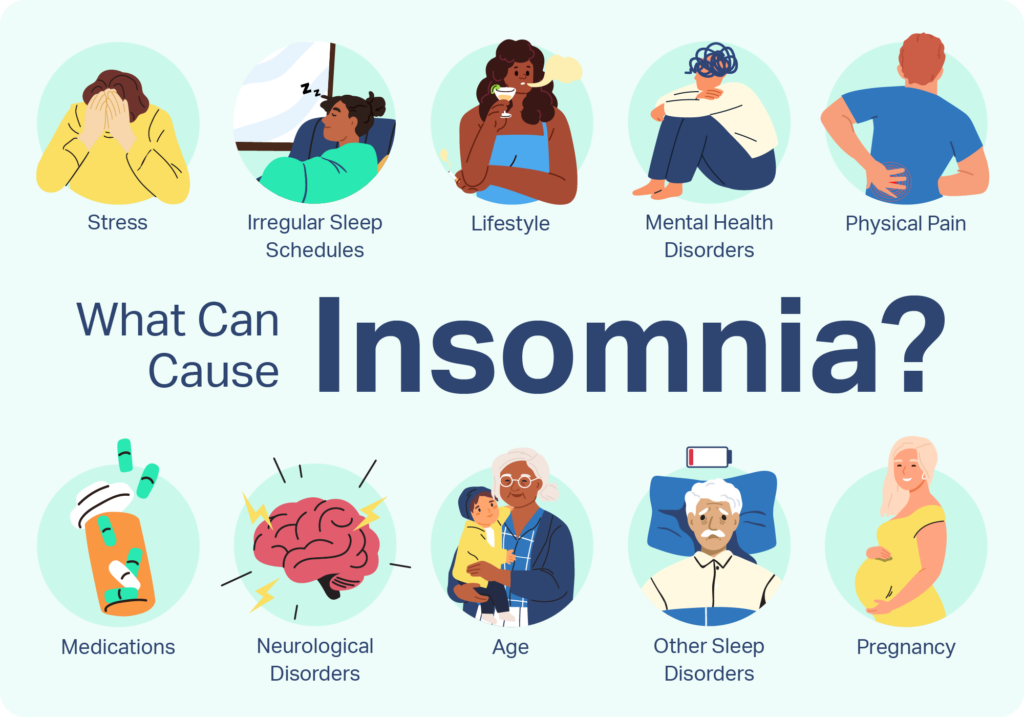Understanding Insomnia: What It Is and How It Affects You
Insomnia is a common sleep disorder that makes it difficult to fall asleep, stay asleep, or wake up feeling rested. Those struggling with insomnia often experience fatigue, mood swings, and decreased concentration throughout the day. But what is insomnia and how to fix it naturally? Many people look for solutions that do not involve medication, aiming for a healthier lifestyle instead.
Insomnia can be either short-term (acute) or long-term (chronic). Psychological causes of insomnia include stress, anxiety, and depression, while physiological causes involve poor sleep habits, excessive caffeine intake, or disruptions in circadian rhythm.
Common Causes of Insomnia and Simple Lifestyle Changes
Understanding the causes of insomnia and simple lifestyle changes to overcome them is the first step to improving sleep quality. Here are some common reasons people suffer from sleep disorders:
- Stress and Anxiety – Worrying too much can keep the brain active at night, making it hard to relax.
- Irregular Sleep Schedule – Disruptions in the body’s natural sleep-wake cycle can lead to chronic insomnia.
- Excessive Screen Time – Blue light exposure from phones and laptops reduces melatonin production, delaying sleep.
- Unhealthy Eating Habits – Certain foods and drinks, especially caffeine and alcohol, interfere with restful sleep.
- Poor Sleep Environment – A noisy, bright, or uncomfortable bedroom can contribute to frequent wake-ups.
Making simple lifestyle changes such as maintaining a regular bedtime, limiting screen time, and creating a calming sleep environment can significantly improve sleep quality.
How to Cure Insomnia Without Medication
For those wondering how to cure insomnia without medication, there are several natural techniques that promote restful sleep:
- Mindfulness and Relaxation – Deep breathing, meditation, and yoga can calm the nervous system before bed.
- Cognitive Behavioral Therapy for Insomnia (CBT-I) – A structured approach that helps reframe negative thoughts about sleep.
- Melatonin Supplements – A natural sleep aid that helps regulate the body’s internal clock.
- Aromatherapy and Herbal Remedies – Lavender, valerian root, and chamomile tea are known to promote relaxation.
Adopting a healthy lifestyle and integrating these natural approaches can help individuals improve sleep and reduce insomnia symptoms effectively.
Quick Bedtime Routines to Fight Insomnia
Developing quick bedtime routines to fight insomnia can be highly beneficial. Some effective habits include:
- Reading a book instead of using screens before bed to encourage melatonin production.
- Practicing gratitude journaling to reduce stress and overthinking at night.
- Listening to calming music or white noise to block out distractions.
These small adjustments can make a significant difference in overcoming sleepless nights.
Best Evening Habits to Fall Asleep Faster
People suffering from insomnia often struggle with falling asleep quickly. Some of the best evening habits include:
- Avoiding caffeine and alcohol in the evening to prevent sleep disturbances.
- Dimming the lights one hour before bedtime to signal the brain that it’s time to rest.
- Engaging in a warm bath or shower to relax muscles and prepare for sleep.
These small but impactful habits can help individuals fall asleep faster and stay asleep longer.
How to Fix Sleep Schedule After Insomnia
Once sleep patterns are disrupted, it can be difficult to return to a normal routine. How to fix sleep schedule after insomnia? Here’s a structured approach:
- Wake up at the same time every day, even on weekends, to regulate your body clock.
- Expose yourself to natural light in the morning to boost wakefulness.
- Avoid napping longer than 20 minutes to prevent nighttime sleep issues.
- Stick to a bedtime ritual, such as reading or stretching, to signal sleep time.
By consistently following these strategies, the body’s circadian rhythm can be restored naturally.
Foods and Drinks That Help with Insomnia Naturally
Diet plays a crucial role in sleep quality. The following foods and drinks help with insomnia naturally:
- Almonds and walnuts – Contain melatonin and magnesium to promote sleep.
- Kiwi and bananas – Rich in serotonin, which converts into melatonin.
- Chamomile and valerian tea – Natural sleep aids that reduce anxiety and promote relaxation.
- Warm milk with honey – Contains tryptophan, which helps in sleep induction.
By incorporating these into a nightly routine, individuals can improve their sleep patterns without medication.
How Does Stress Cause Insomnia and How to Stop It?
Stress is a leading cause of sleep disturbances. How does stress cause insomnia and how to stop it?
- Cortisol production – High stress increases cortisol, which keeps the body in an alert state.
- Racing thoughts – Anxiety prevents relaxation, leading to prolonged wakefulness.
- Muscle tension – Stress tightens muscles, causing physical discomfort during sleep.
Solutions:
- Deep breathing exercises to slow the heart rate and induce calmness.
- Progressive muscle relaxation (PMR) to relieve body tension.
- Journaling before bed to release anxious thoughts.
By managing stress effectively, individuals can significantly reduce the effects of insomnia.
Sleep Hygiene Tips to Overcome Insomnia Quickly
Maintaining good sleep hygiene is one of the fastest ways to combat sleep problems. Some key sleep hygiene tips to overcome insomnia quickly include:
- Keeping the bedroom cool, dark, and quiet to create an ideal sleep environment.
- Using blackout curtains and white noise machines to minimize disruptions.
- Avoiding large meals before bed to prevent digestive issues that can delay sleep.
Following these guidelines can help reset the sleep cycle naturally.
How to Reset Your Circadian Rhythm Naturally
For those whose circadian rhythm is out of sync, a natural reset can be achieved by:
- Spending time in natural sunlight during the day to reinforce the body’s internal clock.
- Exercising in the morning instead of late at night to prevent overstimulation.
- Establishing a regular wake-up and sleep time, even on weekends.
By following these steps, individuals can restore their sleep cycle and wake up feeling refreshed.
